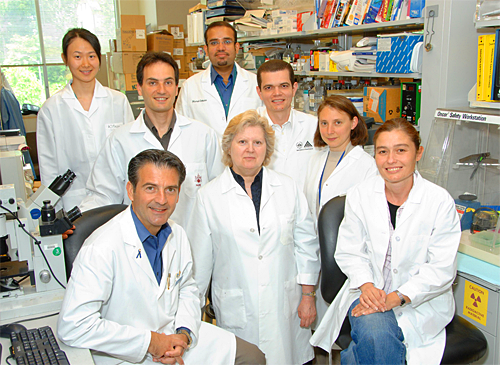You are here: Home > Section on Endocrinology and Genetics
Molecular Genetics of Adrenocortical Tumors and Related Disorders

- Constantine Stratakis, MD, D(med) Sci, Head, Section on Endocrinology and Genetics
- Anton Alatsianos, NIH Summer Student Program
- Madson Almeida, MD, Visiting Fellow
- Evan Ball, BS, Predoctoral Fellow
- Andrew Bauer, MD, Guest Researcher
- Eirini Bimpaki, MD, Visiting Scientist
- Sosipatros Boikos, MD, Visiting Fellow
- Eitan Bornstein, NIH Summer Student Program
- Pavlos Bousounis, NIH Summer Student Program
- Paola Chrysostomou, NIH Summer Student Program
- Myrto Eliades, MD, Visiting Scientist
- Fabio Faucz, PhD, Visiting Scientist
- Limor Drori-Harishanu, MD, Visiting Scientist
- Nirmal Gokarn, NIH Summer Student Program
- Joseph Greene, BS, NIH Summer Student Program
- Michelle Haran, NIH Summer Student Program
- Anelia Horvath, PhD, Visiting Fellow
- Hui-Pin Hsiao, MD, Visiting Scientist
- Linda Kotz, RN, Clinical Assistant, Nursing Coordinator
- Eileen Lange, RN, PNP, Research Nurse
- Andrew Li, NIH Summer Student Program
- Maya Lodish, MD, Clinical Associate
- Andreas Moraitis, MD, Visiting Scientist
- Maria Nesterova, PhD, Staff Scientist
- Audrey Robinson-White, PhD, Researcher
- Kristen Rosano, NIH Summer Student Program
- Anya Rothenbuhler, MD, Visiting Scientist
- Kit-Man Tsang, BS, Predoctoral Fellow
- Anastasios Serbis, MD, Visiting Scientist
- Jennifer Siegel, NIH Summer Student Program
- Somya Verma, MD, Clinical Associate
- Anton Alatsianos, NIH Summer Student Program
We aim to understand the genetic and molecular mechanisms leading to disorders that affect the adrenal cortex, with emphasis on those disorders that are developmental, hereditary, and associated with adrenal hypoplasia or hyperplasia, multiple tumors, and abnormalities in other endocrine glands. We study congenital adrenal hypoplasia caused by triple A syndrome and several endocrine deficiencies; familial hyperaldosteronism; adrenocortical and thyroid cancer; pituitary tumors; multiple endocrine neoplasia (MEN) syndromes affecting the pituitary, thyroid, and adrenal glands; and Carney complex (CNC), an autosomal dominant disease. We focus on cyclic AMP (cAMP)/protein kinase A (PKA) stimulated signaling pathways and PKA effects on tumor suppression, development, and the cell cycle. The prkar1a and pde11a gene mouse models, in which we have knocked out the respective genes, facilitate our research. Genome-wide searches for other genes responsible for CNC and related diseases of the adrenal and pituitary glands are ongoing. We described a new disease (Carney-Stratakis syndrome, or CSS) and observed adrenocortical tumors in association with tumors of the peripheral nervous system and gastrointestinal system (Carney Triad, or CT). The laboratory identified mutations in the succinate dehydrogenase subunits B, C, and D in CSS and, in collaboration with other investigators and the NCI, is currently looking for gene(s) responsible for CT and related tumors.

The Stratakis Laboratory in June 2009
The team led by Dr. Constantine Stratakis (front left), head of the National Institute on Child Health and Human Development’s Section on Endocrinology and Genetics, is researching the genetic causes of pediatric endocrine tumors. With collaborators throughout the world, Dr. Stratakis and his team study genetic diseases that predispose to a variety of endocrine and non-endocrine tumors. The team includes (clockwise from top right) Nirmal Gokarn, Dr. Madson Almeida, Dr. Anya Rothenbuhler, Dr. Anelia Horvath, Stratakis, Dr. Maria Nesterova, Dr. Fabio Faucz, and Kit Man Tsang.
Carney complex genetics
We have collected families with CNC and related syndromes from several collaborating institutions worldwide. Through genetic linkage analysis, we identified loci harboring genes for CNC on chromosomes 2 (2p16) and 17 (17q22–24) and are currently searching for other possible loci for this genetically heterogeneous condition. With the application of state-of-the-art molecular cytogenetic techniques, we are investigating the participation of these currently identified genomic loci in the expression of the disease and have constructed a comprehensive genetic and physical map of the 2p16 chromosomal region for cloning the CNC-associated sequences from this region. Studies in cultured primary tumor cell lines (established from our patients) identified a region of genomic amplification in CNC tumors in the center of the map. The PRKAR1A gene on 17q22–24, which is the gene responsible for CNC in most cases of the disease, appears to undergo loss of heterozygosity in at least some CNC tumors. PRKAR1A is also the main regulatory subunit (subunit type 1-α) of PKA, a central signaling pathway for many cellular functions and hormonal responses. We have increased the number of CNC patients in genotype-phenotype correlation studies, which are expected to provide insight into the complex biochemical and molecular pathways regulated by PRKAR1A and PKA. We expect to identify new genes by ongoing genome-wide searches for patients and families who do not carry PRKAR1A mutations.
PRKAR1A, protein kinase A activity, and endocrine and other tumor development
We are investigating the functional and genetic consequences of PRKAR1A mutations in cell lines established from CNC patients and their tumors. We measure both cAMP and PKA activity in these cell lines, along with the expression of the other subunits of the PKA tetramer. In addition, we are seeking mutations of the PRKAR1A gene in sporadic endocrine and non-endocrine tumors (thyroid adenomas and carcinomas, adrenocortical adenomas and carcinomas, ovarian carcinomas, melanomas and other benign and malignant pigmented lesions, and myxomas in the heart and other sites)—mutations that would further establish the gene’s role as a general tumor suppressor. Many investigators within the NIH and around the world provide specimens on a collaborative basis.
Prkar1a+/− and antisense (AS) Prkar1a transgenic animal models
In collaboration with Heiner Westphal, Lawrence Kirschner, while in our laboratory, developed a PRKAR1A knockout mouse floxed by a lox-P system for the purpose of generating, first, a novel PRKAR1A+/− and, second, knockouts of the PRKAR1A gene in a tissue-specific manner after crossing the new mouse model with mice expressing the cre protein in the adrenal cortex, anterior lobe of the pituitary, and thyroid gland (Kirschner et al., Cancer Res 2005;65:4506). The heterozygote mouse develops several tumors reminiscent of the equivalent human disease. Ongoing crosses with mice such as the transgenic GHRH–expressing mouse attempt to identify tissue-specific effects (in the case of the GHRH-expressing mouse, the pituitary) or specific signaling events (such as involvement of the p53 and Rb proteins in Prkara1a-related tumorigenesis). We also created a transgenic mouse carrying an antisense transgene for exon 2 of the mouse PRKAR1A gene (X2AS) under the control of a regulable promoter. As in human CNC tumors, tissues from mice with the X2AS transgene showed elevated cAMP-stimulated kinase activity. The mice had several CNC-compatible histologic and clinical changes, including obesity attributed to subclinical Cushing syndrome.
PRKAR1A, the cell cycle, and other signaling pathways
We work to identify PRKAR1A-interacting mitogenic and other growth-signaling pathways in cell lines expressing PRKAR1A constructs and/or mutations. Several genes that regulate PKA function and increase cAMP-dependent proliferation and related signals may be altered in the process of endocrine tumorigenesis initiated by a mutant PRKAR1A, a gene with important functions in the cell cycle and in chromosomal stability. Recently, we found an interaction with the mTOR pathway in both human and mouse cells with altered PKA function.
Phosphodiesterase (PDE) genes in endocrine and other tumors
In patients who did not exhibit CNC or PRKAR1A mutations but presented with bilateral adrenal tumors similar to those in CNC, we found inactivating mutations of the PDE11A gene, which encodes phosphodiesterase-11A and regulates PKA in the normal physiologic state. Phosphodiesterase 11A is a member of a 22 gene–encoded family of proteins that break down cyclic nucleotides that control PKA. PDE11A appears to act as a tumor suppressor such that tumors develop when its action is abolished. In fact, in what proved to be the first time that mutated PDE was observed in a genetic disorder predisposing to tumors, we found pediatric and adult patients with bilateral adrenal tumors. Recent data indicate that PDE11A sequence polymorphisms may be present in the general population. The finding that genetic alterations of such a major biochemical pathway may be associated with tumors in humans raises the reasonable hope that drugs that modify PKA and/or PDE activity may eventually undergo development for use in both CNC and patients with other, non-genetic, adrenal tumors—and perhaps other endocrine tumors. Most recently, we identified a patient with a PDE8B mutation and Cushing syndrome (Figure 4.10), with the PDE8B transcript and protein seemingly expressed widely in the endocrine system (Figure 4.11).
Genetic investigations into other adrenocortical diseases and related tumors
Through collaborations, we (1) apply general and pathway-specific microarrays to a variety of adrenocortical tumors, including single adenomas and massive macronodular adrenocortical disease (MMAD), to identify genes with important functions in adrenal oncogenetics; (2) examine candidate genes for their roles in adrenocortical tumors and development; and (3) identify additional genes that play a role in inherited adrenocortical and related diseases, such as Allgrove syndrome.
Genetic investigations into pituitary tumors, other endocrine neoplasias, and related syndromes
In collaboration with several other investigators at the NIH and elsewhere, we are investigating the genetics of CNC- and adrenal-related endocrine tumors, including childhood pituitary tumors, related or unrelated to PRKAR1A mutations. As part of this work, we have identified novel genetic abnormalities in other endocrine glands.
Genetic investigations into other endocrine neoplasias and related syndromes; hereditary paragangliomas and related conditions
As part of a collaboration with other investigators at the NIH and elsewhere (including an international consortium organized by our laboratory), we are studying the genetics of a rare syndrome that predisposes to adrenal and other tumors, the Carney Triad, and related conditions (associated with gastrointestinal stromal tumors, or GIST). In the course of our work, we identified a patient with a new syndrome, known as the paraganglioma and gastrointestinal stromal tumor syndrome (or Carney-Stratakis syndrome), for which we found mutations in the genes encoding succinate dehydrogenase (SDH) subunits B, C, and D. In another patient, we found a novel germline mutation of the PDFGRA gene (Figure 4.12).
Clinical investigations into the diagnosis and treatment of adrenal and pituitary tumors
Patients with adrenal tumors and other types of Cushing syndrome (and occasionally other pituitary tumors) come to the NIH Clinical Center for diagnosis and treatment. Ongoing investigations focus on (1) the prevalence of ectopic hormone receptor expression in adrenal adenomas and massive macronodular adrenocortical disease; (2) the diagnostic use of high-sensitivity magnetic resonance imaging for the earlier detection of pituitary tumors; and (3) the diagnosis, management, and post-operative care of children with Cushing syndrome and other pituitary tumors.
Clinical and molecular investigations into other pediatric genetic syndromes
Largely in collaboration with a number of other investigators at the NIH and elsewhere, we are conducting work on pediatric genetic syndromes seen in our clinics and wards.
Additional Funding
- Kaohsiung Medical University, Kaohsiung, Taiwan. “Clinical and Molecular Genetics of Bilateral Adrenocortical Hyperplasia.” 07/2005 – 06/2007
- INSERM, Paris, France: Co-Investigator with Dr. Jerome Bertherat: Cloning of new genes for Carney complex, 06/2003 – present.
- NIH Bench to Bedside Award: “Use of cyclic AMP analogs in Carney complex and related disorders.” 07/2005 – 06/2007
- Greek Endocrine Society: 1 year fellowsip on neuroendocrinology; molecular genetics of pituitary tumors (10/1/2009 - present)
Publications
- Greene EL, Horvath AD, Nesterova M, Giatzakis C, Bossis I, Stratakis CA. In vitro functional studies of naturally occurring pathogenic PRKAR1A mutations that are not subject to nonsense mRNA decay. Hum Mutat 2008 29:633-639.
- Iliopoulos D, Bimpaki EI, Nesterova M, Stratakis CA. MicroRNA signature of primary pigmented nodular adrenocortical disease: clinical correlations and regulation of Wnt Signaling. Cancer Res 2009 69:3278–3282.
- Horvath A, Korde L, Greene MH, Libe R, Osorio P, Faucz FR, Raffin-Sanson ML, Tsang KM, Drori-Herishanu L, Patronas Y, Remmers EF, Nikita ME, Moran J, Greene J, Nesterova M, Merino M, Bertherat J, Stratakis CA. Functional phosphodiesterase 11A mutations may modify the risk of familial and bilateral testicular germ cell tumors. Cancer Res 2009 69:5301-5306.
- Hsiao HP, Kirschner LS, Bourdeau I, Keil MF, Boikos SA, Verma S, Robinson-White AJ, Nesterova M, Lacroix A, Stratakis CA. Clinical and genetic heterogeneity, overlap with other tumor syndromes, and atypical glucocorticoid hormone secretion in adrenocorticotropin-independent macronodular adrenal hyperplasia compared with other adrenocortical tumors. J Clin Endocrinol Metab 2009 94:2930-2937.
- Bertherat J, Horvath A, Groussin L, Grabar S, Boikos S, Cazabat L, Libe R, René-Corail F, Stergiopoulos S, Bourdeau I, Bei T, Clauser E, Calender A, Kirschner LS, Bertagna X, Carney JA, Stratakis CA. Mutations in regulatory subunit type 1A of cyclic adenosine 5’-monophosphate-dependent protein kinase (PRKAR1A): phenotype analysis in 353 patients and 80 different genotypes. J Clin Endocrinol Metab 2009 94:2085-2091.
Collaborators
- Dalia Batista, MD, Massachusetts General Hospital, Harvard University, Boston, MA
- Jerome Bertherat, MD, PhD, Service des Maladies Endocriniennes et Mètaboliques, Hôpital Cochin, Paris, France
- Stephan Bornstein, MD, PhD, Universität Dresden, Dresden, Germany
- Isabelle Bourdeau, MD, Universitè of Montrèal, Montrèal, Canada
- Brian Brooks, MD, PhD, Ophthalmic Genetics and Clinical Services Branch, NEI, Bethesda, MD
- J.Aidan Carney, MD, PhD, Mayo Clinic, Rochester, MN
- Wai-Yee Chan, PhD, Program in Reproductive and Adult Endocrinology, NICHD, Bethesda, MD
- Adrian Clark, MD, PhD, St. Bartholomew’s Hospital, London, UK
- Nickolas Courkoutsakis, MD, PhD, University of Thrace, Alexandroupolis, Greece
- Jacques Drouin, PhD, Institut de Recherches Cliniques de Montrèal (IR CM), Montrèal, Canada
- Kurt Griffin, MD, PhD, University of Arizona, Tucson, AZ
- Adda Grimberg, MD, Children’s Hospital of Philadelphia, Philadelphia, PA
- Gary Hammer, MD, PhD, University of Michigan, Ann Arbor, MI
- Meg Keil, RN, PNP, Program in Developmental Endocrinology and Genetics, NICHD, Bethesda, MD
- Lawerence Kirschner, MD, PhD, James Cancer Hospital, Ohio State University, Columbus, OH
- Anne Klibanski, MD, Massachusetts General Hospital, Harvard University, Boston, MA
- Andre Lacroix, MD, PhD, Centre Hospitalier de l’Universitè de Montrèal, Montrèal, Canada
- Stephen Libutti, MD, Center for Cancer Research, NCI, Bethesda, MD
- Jennifer Lippincott-Schwartz, PhD, Cell Biology and Metabolism Program, NICHD, Bethesda, MD
- Stephen Marx, PhD, Surgery Branch, NCI, Bethesda, MD
- Ludmila Matyakhina, PhD, Medical Genetics Branch, NHGRI, Bethesda, MD
- Nickolas Patronas, MD, Diagnostic Radiology, Clinical Center, NIH, Bethesda, MD
- Margarita Rayada, PhD, Program in Reproductive and Adult Endocrinology, NICHD, Bethesda, MD
- Owen M. Rennert, MD, Program in Reproductive and Adult Endocrinology, NICHD, Bethesda, MD
- Matthew Ringel, MD, PhD, Ohio State University, Columbus, OH
- Michael Stowasser, MD, University of Queensland, Brisbane, Australia
- David Torpy, MD, University of Queensland, Brisbane, Australia
- Antonis Voutetakis, MD, Gene Therapy and Therapeutics Branch, NIDCR, Bethesda, MD
- Heiner Westphal, MD, PhD, Program in Genomics of Differentiation, NICHD, Bethesda, MD
Contact
For more information, email stratakc@mail.nih.gov or visit segen.nichd.nih.gov.



